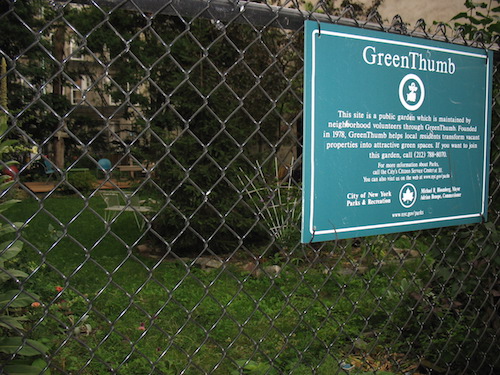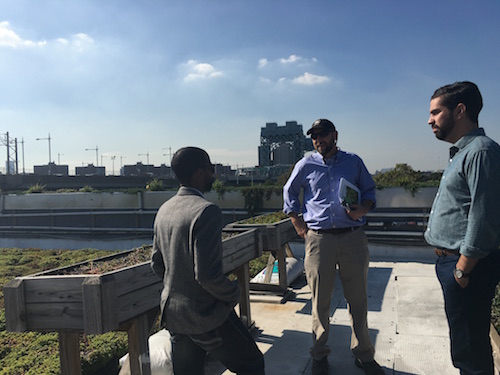Ahh, there’s nothing like the late summer look of the Flatbush cornfields when the stalks are high and the elevated subway along McDonald Avenue rumbles by.
It’s the kind of tune Brooklyn Borough President Eric Adams and City Councilmember Rafael Espinal (D-Bushwick, East New York) are hoping to sing if their proposed Comprehensive Urban Agriculture plan ultimately sees the light of day.
The two lawmakers got the plan rolling yesterday as they introduced legislation in the City Council for the City’s Department of City Planning (DCP) to create a comprehensive urban agriculture plan for the city. The multi-pronged plan includes a variety of methods to harness the global urban farming industry estimated at a value of $5.8 billion in the next five years.

“We have the power to transform Brooklyn’s urban spaces from concrete jungles to green oases,” said Adams. “My commitment to urban agriculture has certainly grown with my personal appreciation of nutrition’s transformative power over an individual — and a community’s — quality of life. We need to expand our minds to see the full long-term economic impact of this investment, including the effects on academic achievement, health care costs, and complementary business development.
The measure proposes to catalogue existing and potential urban agriculture spaces, classify and prioritize urban agriculture uses, and to identify potential land use policies to promote the expansion of these practices across the city. Additionally, it will analyze current zoning, building and fire codes to foster the industry.
If all goes as planned, it will integrate urban agriculture into the City’s conservation and resiliency plans and spur the creation of the City’s Office of Urban Agriculture.

“As droughts and floods become more frequent across the globe because of climate change, our traditional agriculture systems are at risk of producing fewer and fewer crops,” said Espinal. “Urban farming will address the issues of potential food insecurities in major cities by turning current food deserts in low-income communities into food farms. As climate change and social inequality are linked, we must get creative about solving both problems and use the tools available to us.”
This proposal comes on the heels of a recent Center for Urban Business Entrepreneurship (CUBE) at Brooklyn Law School study which found that New York City has enough unused rooftop space — totaling 14,000 acres — to grow enough produce that could feed as many as 20 million people in the New York metropolitan area.
Additionally, the Design Trust for Public Space (DTPS) did a ‘Five Borough Farm’ study of urban agriculture, which found that current urban farming and community gardening activities, ranging from beekeeping to farmers markets to youth leadership training in over 900 sites, all have tremendous benefits and positive health, social, economic, and ecological impacts on communities.
 “New York City has the largest number of urban farms and gardens in both public and private sectors of any city in the country. Currently, citywide coordination among them is lacking,” said DTPS Executive Director Susan Chin. “Borough President Adams and Council Member Espinal’s proposed comprehensive effort is a pivotal moment to bridge these gaps and maximize the benefits, and achieve the highest potential of urban agriculture to make the city greener and to create green jobs.”
“New York City has the largest number of urban farms and gardens in both public and private sectors of any city in the country. Currently, citywide coordination among them is lacking,” said DTPS Executive Director Susan Chin. “Borough President Adams and Council Member Espinal’s proposed comprehensive effort is a pivotal moment to bridge these gaps and maximize the benefits, and achieve the highest potential of urban agriculture to make the city greener and to create green jobs.”
To date, Adams has allocated more than $2.5 million through his Growing Brooklyn’s Future initiative to advance greenhouse studies, including hydroponic farming, at 17 schools in Bedford-Stuyvesant, Brownsville, Canarsie, Carroll Gardens, Cypress Hills, East New York, Mapleton, Marine Park, and Williamsburg. He is also actively working with the New York City Housing Authority (NYCHA) to establish a large-scale greenhouse, the first of its kind on public housing property in New York City.
Earlier this year, Adams and Espinal made a commitment of $2 million in capital funding — $1 million each from their respective offices — toward the creation of an urban agriculture incubator in the borough.
“Through this innovative industry we will improve air quality in low-income neighborhoods, prevent flooding of our waterways, increase access to healthy foods to those in need, and create jobs. The City of New York must create a comprehensive urban agriculture plan in order to deal with the challenges of today and tomorrow,” said Espinal.






